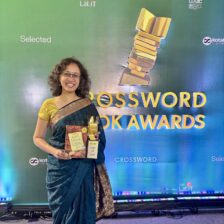Many, many parents ask me what a reading workshop is. What happens during a reading workshop? Who should attend a reading workshop and why? What will the outcome of a reading workshop be? This post tries to explain all that.
What children read and why
Often, at reading workshops I conduct, we talk about books we love. I’m not very fond of the question ‘What is your favourite book?’ because I think it is impossible to have a favourite book. I do realise, however, that it’s a promising start to a conversation, plus a way for me to get an idea of the interest and reading level of the group I’m working with.

“What do you read?” I ask, attempting to be neutral in my question. I don’t ask them how many enjoy reading because that feels like a trick question. They are already conditioned enough to know they are “supposed” to like reading. The question has to feel less threatening; What do you read? usually works.
When I’m dealing with children whose linguistic level matches their emotional level, I learn about all kinds of books that children enjoy. It’s thanks to children that I discovered Geronimo Stilton, Tom Gates, Dork Diaries, and so many others.
With many other groups, though, listening and speaking happen in one language, while reading and writing happen in another. Often, children aged 12 and 13 study in an English-medium school but have no command over the language, as a result of which what they read is poles apart from what I would call enjoyable fiction.
“William Shakespeare is my favourite author,” twelve-year-olds tell me. “And Charles Dickens.”
I hear all these. Children apparently like Jane Austen, William Wordsworth, Thomas Hardy … Because that’s what they think I want to hear. I wrote about this in an earlier post when I spoke about adult expectation.
At the other end of the spectrum, there are wonderfully naive children, who are not inhibited by expectation. Aged 11 and 12, they comfortably and confidently tell me that the last book they read was Cinderella.
And then, of course, there are children who love reading and devour books – much like I did when I was a child. A reading workshop brings all these children together and gives them a safe space to talk about their relationships with books. The sparkling eyes and excitement that go hand in hand with movies children love? That’s what I try to bring into the world of books through reading workshops.
What does a reading workshop do?

A reading workshop tries to bring back the fun element of reading. Why do we read? Sure, Geronimo Stilton may be my favourite character ever, but when I’m struggling with hormones aged 15 or 16, do I want to continue reading about the adventures of mice? Is it not more likely that I will give up reading altogether?
Reading workshops seek to introduce children to books they will love, books they get completely immersed in. This is much more difficult than it sounds, the older children get. When reading is difficult and time-consuming, developing the habit is a huge investment of precious time, when children would rather dance, play football, watch television …
(And this is okay. It is something I’ll write about in another post. There are many adults who hardly read at all as children. Does that make them “less” in any way? I don’t think so!)
Who should/could attend a reading workshop?
A workshop addresses all kinds of children: those who don’t know what to read, and those who love reading.
Those who have never read for pleasure, and those who read only for pleasure.
Those who are surrounded by readers in daily life, and those who have no one to talk to about the last book they loved.
Longer reading workshops give children the space to read and do activities together. They help children share ideas of reading and often, children often take the next step themselves–they create books and charts of their own.

A workshop is a tiny step, though, if we want reluctant readers to read for pleasure. To fall in love, we need a long-term relationship first, and that’s why workshops with parents and teachers are crucial too. They are the ones who can build those relationships and ensure that children have the time to read.
When is the next workshop?
My workshops calendar will tell you everything you need to know!
To be intimated about forthcoming workshops programmes in advance, please fill this form or follow me on social media – Facebook, Instagram and Twitter.
Do you still have questions? Write to me, or leave a comment here!

Here’s another article about reading programmes, written from a different perspective. That’s what I meant in an earlier post when I said that there are many, many people working on the same thing! https://www.linkedin.com/pulse/why-reading-programmes-fail-ritu-lamba/
The importance of stories – https://www.kqed.org/mindshift/51281/whats-going-on-in-your-childs-brain-when-you-read-them-a-story
Hello , I want to enroll my son who is 7yrs for reading class . Please do let me the registration process .
Thank you for expressing interest in my online reading programme. I have sent you an email with the details.